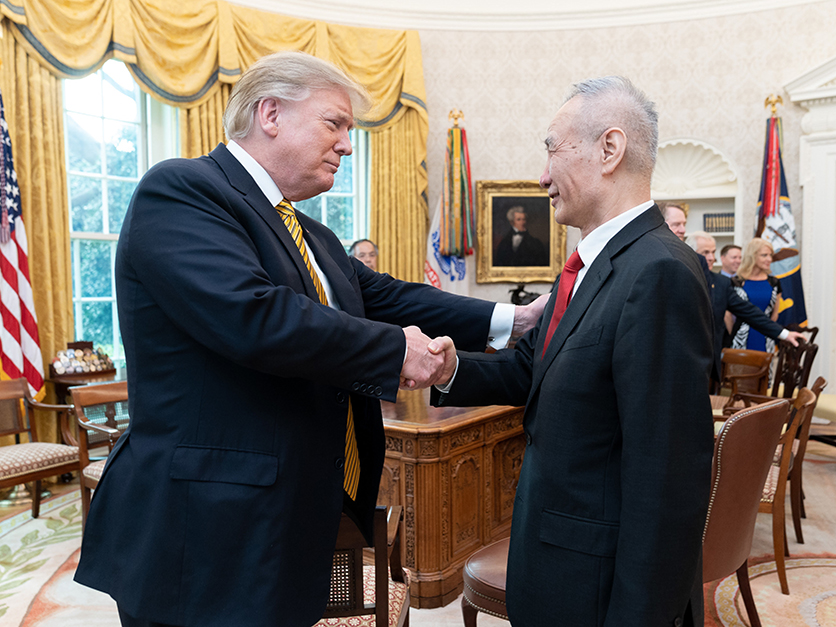The United States and China have agreed to a tentative trade deal that addresses biotechnology restrictions and other key agricultural issues while substantially boosting U.S. farm exports, President Donald Trump said Friday.
There are still parts of the deal that need to be finalized, and that will take three to five weeks to complete. Trump called the agreement “Phase 1” of two or three steps that it will take to end the trade war.
If negotiators are successful in finishing this deal over the next several weeks, China has agreed to import $40 billion to $50 billion worth of U.S. ag commodities on an annual basis. China imported only $9 billion worth of U.S. ag products in 2018, but purchases were much higher in recent years before the trade war began. China imported about $26 billion worth of U.S. ag in 2012, according to USDA data.
“We cover a lot more territory than agriculture, but I’m very excited for the farmer because there’s never been a deal of this magnitude for the American farmer,” Trump told reporters in the Oval Office after two days of negotiations this week in Washington.
Beyond the promises of purchases, China has agreed to make structural changes to its biotech and sanitary and phytosanitary policies that will make it “much easier now for American farmers to be able to ship to China,” U.S. Trade Representative Robert Lighthizer said. He did not elaborate.
China’s biotech approval process is one of the slowest and most opaque in the world. China is the only major grain and oilseed importer that operates an “asynchronous” approval process for biotech traits. China refuses to begin an approval of a new trait until after a cultivating country like the U.S., Brazil, Argentina or India first finishes the process.
Under the tentative “Phase 1” that Trump says he hopes is ready for he and Chinese President Xi Jinping to sign next month, the U.S. has agreed to hold off on a plan to increase tariffs on $250 billion of Chinese goods by 5% that would have gone into effect next week, but neither country has pledged to tear down any of their import taxes that are still in place.
Trump said he did not believe the deal would fall apart, but Treasury Secretary Steven Mnuchin stressed that “there is more work to do and we will not sign an agreement unless we … can tell the president that this is on paper.”
There’s still a lot that’s not clear about what has been agreed upon that has farm industry leaders and lawmakers wanting to know more.
“While we are glad to see a détente in this seemingly endless trade war, the tangible benefits to American family farmers and ranchers are unclear,” National Farmers Union President Roger Johnson said. “There are many questions that still need to be answered: What will these agreed to policy reforms look like? How will they be enforced? And over what time frame will the $50 billion of agricultural purchases - an amount that is double our peak annual farm exports to China - take place?”
Senate Finance Committee Chairman Chuck Grassley, R-Iowa, said he was pleased to see progress in ending the trade war, but still has concerns.
“Any time progress is made, that’s good news,” he said. “But we need to know more about this deal and follow-through from China will be key … After so much has been sacrificed, Americans will settle for nothing less than a full, enforceable and fair deal with China. I look forward to learning more details in the coming days.”
Sen. Joni Ernst, R-Iowa, said: “No new tariffs on goods plus additional purchases of agricultural products, like Iowa soybeans and pork, is a good sign. I look forward to learning more details about this phase of the deal.”


